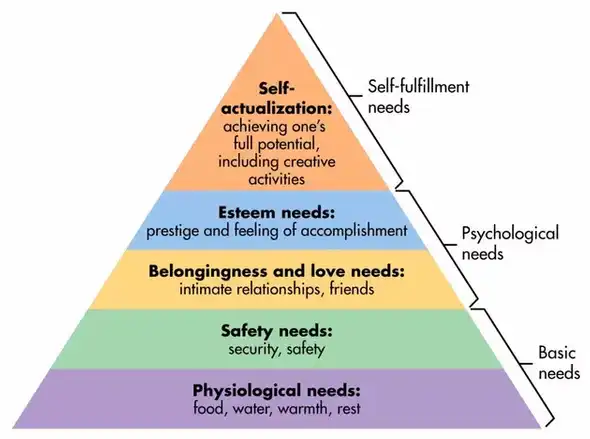Thoughts on Maslow's hierarchy of needs
October 30, 2020 - 5 min read
 Image credits Simply Psychology
Image credits Simply Psychology
I came across an instagram post depicting Maslow’s hierarchy of needs a while ago, and thought about a few stuff:
-
Most people living close to the poverty line do not have their physiological needs met. This is especially true in low income countries but is also relevant to any society, even high income countries
- In Pakistan, there are a lot of people living like this. According to the World Bank definition of poverty line i.e. people living below $ 1.9 per day, around a quarter of Pakistan’s population lives in poverty
- More details on this can be found in my earlier post on Socio-economic conditions in Pakistan
-
Then come safety needs:
- Most homeless people globally suffer on this
- A lot of people in Pakistan, even those in the middle class would struggle with this due to lawlessness and a lack of merit
- This hinders social progress a lot, since then people can’t focus on higher goals
- Someone without a roof on their head will not be able to think of much except to aim for either survival or, at the other extreme end, can perhaps even turn to suicide
-
For people whose basic needs are not being met, well-being and mental health perhaps do not even make too much sense. And definitely, the higher needs also do not even make much sense
- But a counter-argument could be that perhaps these people can be helped with their psychological needs, so that they can perhaps focus better on getting their basic needs met. At least, this will minimize suffering. This is perhaps quite relevant if we consider well-being as the absolute measure to optimize for
-
For love and belongingness:
- A significant number of people globally face loneliness. Their basic needs are being met, but they continue to suffer and are thus not able to focus on higher goals
-
These needs can be increasingly met through digital means, for example:
- Tinder: Connects people in intimate relationship
-
Social media such as Facebook, Twitter etc which can help people connect with each other
- Although social media comes with its own set of negative and harmful consequences as well such as increased polarization, decrease in overall well-being. Some people, in particular, will get extremely effected be these
-
Mental health and well-being oriented apps such as UpLift, Mind Ease etc
- A more comprehensive list and detailed reviews of such apps can be found at One Mind PsyberGuide
-
Esteem needs: People who are doing well in their basic needs and feel well psychologically can focus on achievement and accomplishment
- This also includes self-esteem
-
I think that some people potentially skip this step altogether. For example, I do not care much about achievement and accomplishment, at least I think so. I rather think that I can only try my best, and then see how that plays out
- However, self-esteem is quite important, and is a significant blocker that can have trickle down effects to the lower levels in the hierarchy as well
-
Self-actualization is perhaps the ultimate end of the spectrum. It’s a state where one realizes their full potential as a human, helps others, works for social progress, thinks and acts about issues greater than them self, has a somewhat high degree of confidence in their search for truth, and is satisfied with where they are in life.
- While creative pursuits are mentioned here as well, I do not have a strong opinion about those. I think that while all forms of art or creativity have meaning and help us really enjoy life, art detracts people from helping the world come to a sense of equilibrium and equality.
After-thoughts
-
In a recent discussion with a close friend, he mentioned that self-actualization is the god that you completely submit to
- You dedicate your life, consciously and sub-consciously, in the pursuit of an ideal
- For some people, it’s money. For some it’s fame and acclaim. For some, it’s the God of their religion, and the principles laid by Him
- I think that makes a lot of sense, but I also feel that there’s also more to it
- I am also likely not able to understand and vocalize this so well
-
During discussion with some people at the Effective Altruism Student Summit, I realized that the primacy of a need does not necessarily imply that it is the most urgent or impactful [[cause area]] to work on
- Additionally, different interventions can be targeted at different populations depending on their needs
-
I am currently reading Transcend: The New Science of Self-Actualization by Scott Barry Kaufman, which is a reframing of Maslow’s work to account for his unpublished work and notes, as well as to clear common misconceptions around it. It also takes into account the advancement and evidence from science that has accrued over the last few decades
- It will likely change my beliefs quite a lot, and so far I have found it an extremely interesting read